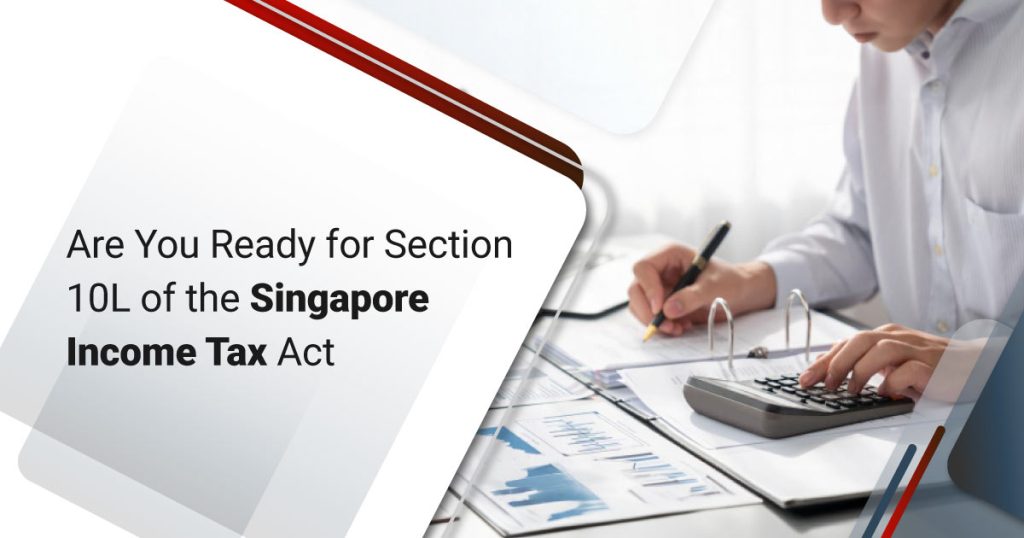Singapore has long been recognised for its strategic approach to taxation, balancing the need to attract international businesses with the commitment to global tax compliance standards. The latest development in this balance is the introduction of Section 10L in the Singapore Income Tax Act 1947.
This amendment signifies a fundamental shift in the tax landscape, particularly impacting multinational enterprises (MNEs) and businesses with cross-border transactions. This article aims to dissect this new section for a comprehensive understanding, ensuring that both local and foreign business leaders are well-equipped to navigate these changes.
Understanding Section 10L
The Core of Section 10L
At its core, Section 10L is about taxing gains from the sale or disposal of foreign assets by Singapore-based entities, a move away from the historical non-taxation of such gains.
This section targets entities within multinational groups that lack significant economic substance in Singapore, a standard that aligns with global efforts to combat tax avoidance.
The implications are profound: routine asset sales and restructuring transactions, previously untaxed, now potentially fall within the scope of Singaporean tax jurisdiction.

The Intricacies of Section 10L
Ruling on Economic Substance
The economic substance test is central to Section 10L compliance. It involves assessing whether the principal operations of an entity are conducted in Singapore by its employees or third parties.
Considerations include the scale of operations in Singapore, the number and expertise of employees involved, and the amount of business expenditure incurred locally.
Entities anticipating sales or disposals of foreign assets can seek certainty by applying for an advanced ruling from IRAS, providing them a compliance assurance for five years, subject to consistent facts and unchanged tax regulations. Prior insight from an expert like InCorp would prove valuable in terms of time and cost in this analysis.
Scope and Limitations of Section 10L
Understanding the boundaries of Section 10L is crucial. Significantly, entities that are foreign to Singapore (i.e., not established, registered, or incorporated there) and do not operate from within the country, are not subjected to the regulations of Section 10L. This distinction is essential for comprehending who exactly is impacted by this legislation.
Exemptions Within Section 10L
Several specific scenarios exempt gains derived from the sale of foreign assets from Section 10L’s scope. These exemptions include:
- Transactions executed as a part of or incidental to the business activities of designated financial institutions.
- Sales carried out in connection with the business operations of entities benefiting from tax exemptions or concessionary tax rates under specific Singaporean tax incentive schemes.
- Transactions conducted by an entity categorised as an ‘excluded entity’.
Considering Overseas Permanent Establishments (PEs)
A group’s susceptibility to Section 10L is determined if its entities are not all based in Singapore or have a business presence abroad. For groups exclusively operating within Singapore, the emergence of an overseas branch or permanent establishment can shift their status, bringing them under Section 10L’s purview. Therefore, such groups must undertake a thorough tax review to determine if they fall under this section.
Interaction with Section 13 Tax Exemptions
From the beginning of 2024, entities affected by Section 10L will find that exemptions under Section 13, like the 13W exemption for disposals of ordinary shares, may no longer be applicable. This necessitates a reassessment for businesses that previously relied on these exemptions.
Sale Price Considerations under Section 10L
When sales or disposals of foreign assets occur below their open-market value, the gain calculation is crucial. The formula (Actual Gain + Open-Market Price – Sale Price) is employed for this.
However, it is important to note that if no gains are received in Singapore, the difference between the open-market price and the sale price is not taxed by IRAS. The formula comes into play when any portion of the gains is received in Singapore.
Treatment of Losses
Losses from the sale or disposal of foreign assets, where gains would be within the scope of Section 10L, can offset future taxable gains under this section.
Intriguingly, these losses appear to be available for offset against future gains irrespective of substantial changes in the entity’s shareholder structure, although future regulatory changes might alter this aspect.
Guidance Issued by IRAS
The Inland Revenue Authority of Singapore (IRAS) has
provided an e-Tax Guide, which is instrumental in clarifying the tax treatment of gains and losses from the sale or disposal of property situated outside Singapore.
For further insight into how the text of this guide affects your organisation, we strongly recommend you consult with a reputable local tax consultancy like InCorp.
The Rationale Behind Implementing Section 10L
The introduction of Section 10L is not in isolation but a response to global tax reforms, particularly the OECD’s Base Erosion and Profit Shifting (BEPS) project and the European Union’s guidelines on Foreign-Sourced Income Exemption Regimes.
These initiatives aim to curb aggressive tax planning strategies that exploit gaps and mismatches in tax rules to artificially shift profits to low or no-tax locations.
By implementing Section 10L, Singapore aligns its tax system with these international standards, demonstrating its commitment to fair tax competition and discouraging profit-shifting practices.
The focus on economic substance ensures that tax benefits are accorded to entities with authentic business activities in Singapore, thus fostering genuine economic growth.

Implications for Businesses: Adapting to the New Tax Regime
Strategic Reassessment for Compliance
The enactment of Section 10L necessitates a strategic shift for businesses, especially those involved in international dealings. MNEs must now carefully examine their tax structures and transactional flows to assess the impact of this new provision. The key is understanding the link between their economic activities and the consequent tax liabilities under this new regime.
For instance, a multinational group with routine asset sales outside Singapore but receiving gains in Singapore will now face a new tax reality. This change urges businesses to re-evaluate their operational and tax planning strategies to align with the new provisions while optimizing their tax positions.
Preparing for Section 10L: Strategic Approaches for Businesses
Proactive Engagement and Planning
Adapting to Section 10L requires a genuinely proactive approach. Businesses should begin with a comprehensive tax review, identifying areas of potential exposure under the new law. This review should include an analysis of all cross-border transactions and an assessment of the entity’s economic substance in Singapore.
Where necessary, restructuring of operations or realignment of business models might be required to comply with the new rules. Seeking expert advice is crucial in navigating these complexities.
InCorp, with its expertise in corporate solutions in the region, is well-positioned to guide businesses through this transition, offering insights and strategies tailored to the unique needs of each business.
Where to Next With InCorp
Section 10L marks a significant transition, especially for multinational enterprises and businesses engaged in cross-border transactions. The intricate details of this new section, from the core implications to the specific exemptions and considerations, underscore the need for thorough understanding and strategic planning.
As we enter this new stage of enhanced tax compliance, the expertise and guidance of InCorp become more crucial than ever. Our team of skilled professionals is dedicated to providing comprehensive solutions and insights, ensuring your business not only complies with these changes but also thrives in this altered tax environment.
Reach out to InCorp today to navigate Section 10L with confidence and take proactive steps towards a compliant and prosperous future.
FAQs on Section 10L
- Starting in 2024, entities impacted by Section 10L will find that exemptions under Section 13, like the exemption for disposals of ordinary shares (13W), are no longer applicable, necessitating a reassessment of their tax strategies.
- Section 10L primarily affects multinational enterprises and businesses with cross-border transactions, especially those lacking significant economic substance in Singapore. However, it exempts foreign entities not operating in Singapore, certain financial institutions, and entities with specific tax exemptions or concessions.
- InCorp provides expert advice and strategic planning to help businesses understand and adapt to the new requirements of Section 10L. Our comprehensive approach ensures businesses are well-equipped to comply with the new regulations and optimize their tax positions.
About the Author
InCorp's content team includes talented copywriters from our regional group and globally. We contribute informative, thought leadership, and market-trending articles to guide aspiring business entrepreneurs to a higher level across the Asia-Pacific region.
More on Business Blogs




